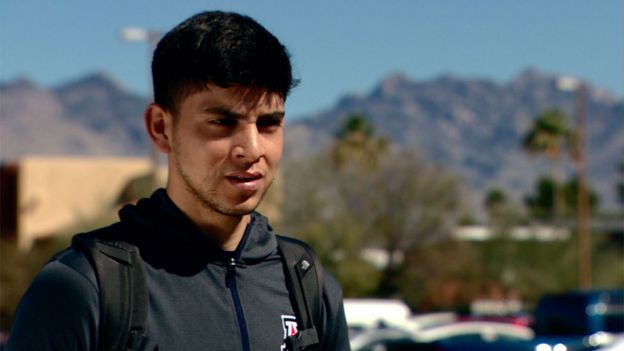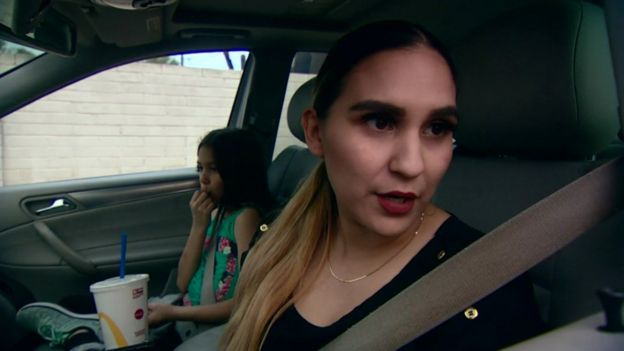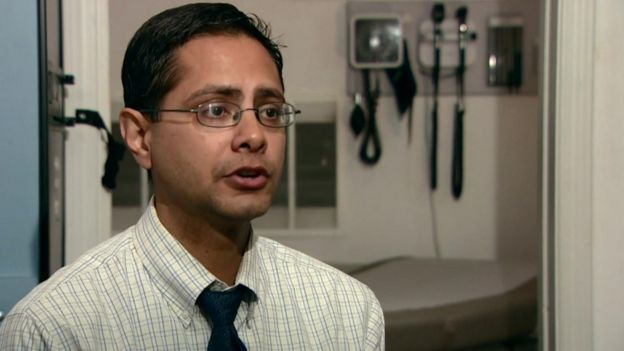
This article is more than
5 year old
Sebastian shows me his hands. His skin is dry and cracked through over washing.
"I've always been obsessed with washing my hands because growing up I knew if I got sick I wouldn't be able to see a doctor," he tells me.
Sebastian has lived in the US since he was three years old, after having been brought here from Mexico by his parents. He is one of the estimated 11 million people in the country who are "undocumented".
No US citizenship means no US healthcare.
Even the language of Barack Obama's Affordable Care Act makes it very clear that undocumented immigrants are excluded.
"I never went to a doctor, if I got sick my mom would always try to treat it at home, but I remember getting very sick sometimes and missing a lot of school," says Sebastian.

The day we meet is the day the first coronavirus case has been confirmed in his area, but Sebastian says that while his family have seen all the news about the virus, their reality remains the same.
"Being undocumented it's hard to get medical attention. There's the aspect of presenting yourself to the legal system at medical facilities and that runs the risk of deportation," he says.
"My family may not be criminals, but they sure are undocumented and seeing a doctor scares them."
For everyone in the US, whether they are undocumented or not, there is also the huge expense involved in even just seeing a doctor.
More than 27 million people in America have no medical insurance at all, a number that has been growing dramatically during the Trump presidency.
A consultation with a doctor for someone without insurance costs hundreds of dollars.
But there are tens of millions more who are classed as being "underinsured" - having basic insurance that often only covers a fraction of the cost of any check ups or treatment.
"During the flu season we are getting sick a lot, but taking my children to see their paediatrician costs $100 each visit just for a check," says Lisa Rubio, 28, who has basic health insurance through her employer.
"I started with a cough and a sore throat a week ago, but if the doctor tells me they can't prescribe anything, that it's just a virus, I have to decide whether it's worth it to take away money from my bills and my children's other needs."

Last year, being underinsured contributed to a devastating episode for Lisa.
"I got sick. I felt pain coming in my chest. But for me to go see a doctor even though I am insured, I couldn't afford it so I tried to ignore the pain."
"Two weeks later, in the middle of the night, my lung just collapsed completely. They had to do intensive care but said if I had caught it sooner, it would have been better," she says.
Lisa suffers these problems even though she herself is an administrator in a hospital in Tucson.
And while public health workers are one of the groups with the highest risk of infection, they also fall foul of another systemic issue in the US under the spotlight during this crisis; the fact that there is no requirement for American employers to offer paid sick leave.
"I'm really worried for my patients that can't take time off work to come and get care and who will go to work even when they are sick because they have no other way to pay for their food and utilities. Coronavirus does not change that," says Dr Ravi Gravois Shah.
Dr Shah is the director of a mobile health clinic that is run on charitable donations. Driving around Tucson, the clinic treats around fifty patients a week who cannot normally access any medical care.
But Dr Shah admits that that is only a drop in the vast ocean of need in the community.
"All the time we come across patients who are going through pregnancy without seeking care, or people who for months and years can't get care, diagnosis and treatment for their pain or chronic disease," he says.

Dr Shah says that even before the coronavirus, the huge number of patients going undiagnosed with HIV or other sexually transmitted infections was just one example of the public health crises being exacerbated because so many have no access to healthcare.
"I have not seen any evidence that anything is going to be different with the coronavirus," he says, unconvinced by the promises from Washington.
"For decades, we've been okay as a society knowing that there are so many in our community who are uninsured, underinsured, undocumented and unable to take sick leave," he says.
"These individuals without access to care are going to get sicker, are going to spread the disease more frequently because they're not getting care or isolating, or getting diagnosed and treated. And we are going to pay the public health price because of what our society is okay with."
As it sweeps across nations, the coronavirus is exposing systemic flaws. In China, it was freedom of information; here in the US it is the massive disparities in the way people are treated depending on their economic circumstances and their immigration status.
The coronavirus of course does not discriminate on those grounds and having large sections of society being unable to see a doctor is suddenly in focus as not just being bad for the individuals themselves, but for the country a whole.